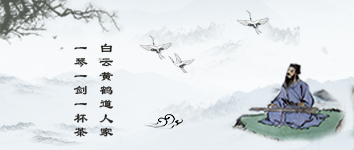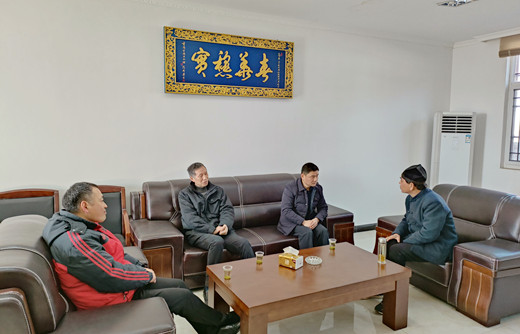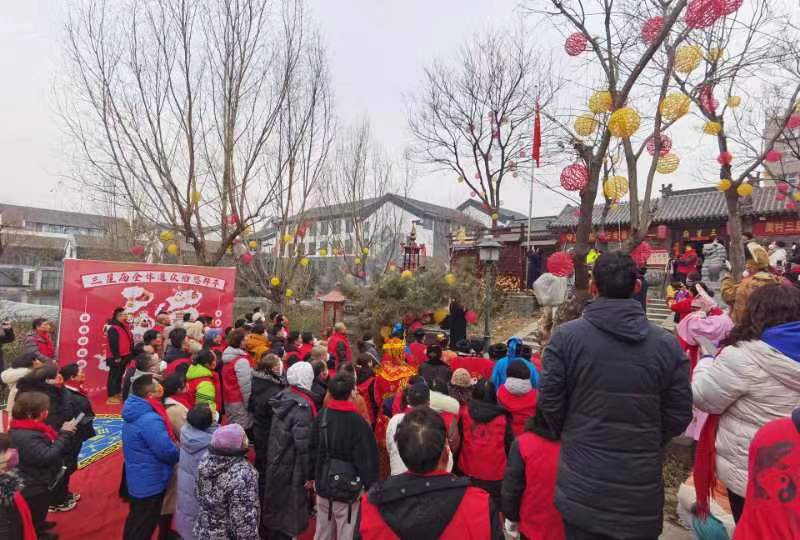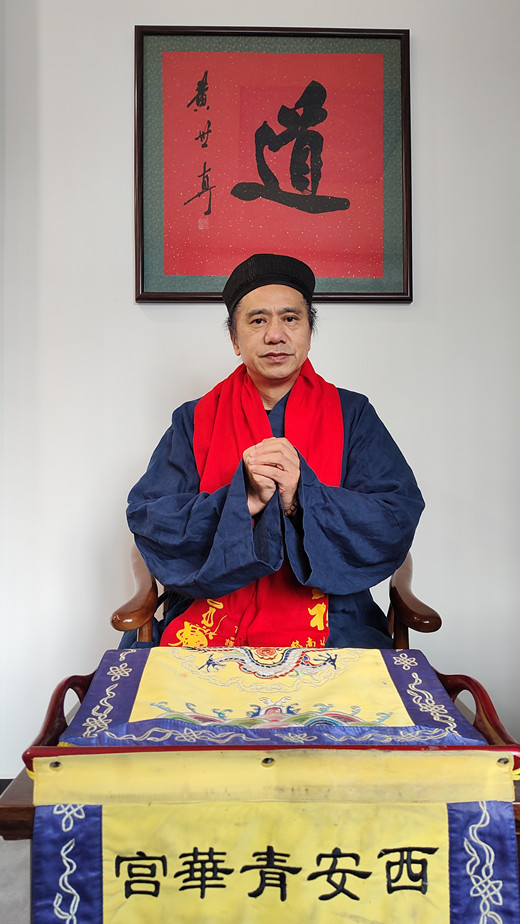道教思想五论——关于道教教义现代阐释的思考
道教之音 张继禹
2012-12-14
各位老师、同学们、朋友们:
大家好!很高兴应邀来到贵校,与各位进行交流。
Professors, students, friends, I am very happy to be here to share some time with you.
今天我想就道教基本教义作些阐述。
道教是中国本土所固有的宗教,道教文化是中华传统文化的重要组成部分。在道教文化中,道教教义思想居于基础和核心的地位。自祖天师立教以来,道教教义思想经历不断丰富发展的几大阶段,如魏晋南北朝时的神仙之道、隋唐时期的重玄之道、宋元时期的内丹之道等,使道教不断在因应社会文化发展、民众精神需要及引领信仰中发挥积极作用。到了现代社会,道教迫切需要在继承传统的基础上对教义作出新的阐释,从而建构起一种适应现代社会发展和民众信仰需要的新的教义思想体系。
Today I would like to make a few observations concerning some fundamental Daoist doctrines. Daoism is China’s own higher religion and an important constituent of Chinese culture and history. During the course of Daoist history its doctrines also developed through several major stages, such as the transcendent practices of the Period of Division, Double Mystery thought of the Sui and Tang, the Inner Alchemy of the Song and Yuan dynasties, etc. All of these developments occurred in response to social change and the spiritual needs of the Chinese people. In response to the needs of present-day society, Daoism urgently needs to construct new doctrines that are built on the basis of traditional Daoism.
道教思想五论正是基于这样一些思考上提出的。我以为,这五论是对道教教义思想最重要的五个方面所作的现代阐释。我们希望以道神一元论为根本,以道物依成论、生道合一论、道术体用论为依据,以道俗圆融为目标,通过梳理与阐释,为现代道教教义思想的建构作出探索。
My five basic principles of Daoism are: 1) The fundamental unity of the Dao and spirits as a basis; 2) the codependence of the Dao and material things, 3) the unity of life and the Dao, and 4) Dao and Techniques as substance and utility as corollaries; and 5) the perfect integration of the Dao with the secular as the final goal. Through analyzing these five things in the context of the Daoist tradition, we can explore present-day Daoist doctrine.
一、道神一元论。The fundamental unity of the Dao and spirits.
“道”,在道教的教理教义中居于核心位置,也是道教的最高信仰。然而道教同时也是一种信仰众多神灵的宗教。道教的核心信仰,是以“神仙”为核心还是以“道”为核心呢?此二者究竟谁是立教之根本?这是我们学习道教、信仰道教首先要回答的一个问题。
The concept of “dao” naturally occupies a central place in Daoism. At the same time, Daoism is a polytheistic religion. So which stands at the center: the gods and transcendents or the single Dao? This is obviously an important question to answer.
通常认为,以《道德经》、《庄子》为代表的先秦道家典籍,更多的是一种哲理性的经典,其所谓“道”,也是一种哲理性的范畴和概念。但我们是否能在《道德经》、《庄子》中发现其关于“神”的宗教性情结呢?实际上,先秦道家典籍本身就包含神仙的内容和修仙的方术。《道德经》以“道”为最高范畴,并提出道在“象帝之先”,但并没有否定天神(“象帝”)的存在,只是认为“道”比“象帝”更为根本,“象帝”也是“道”所派生的。这就意味着,“神”源于“道”,“神性”即“道性”。从这个意义上讲,《道德经》已经蕴含着“道神一元”的思想。《庄子》中更进一步阐述了道为神之源,神以道为本。《庄子•大宗师》说,“夫道”“有情有信”、“无为无形”,“神鬼神帝”、“生天生地”。天神(“帝”)之所以具有神妙莫测的力量,就在于其内在的道性使然。
It is commonly believed that the early Daoist philosophical works, the Daodejing and the Zhuangzi explain the Dao in fairly rational terms. But do they have anything to say about spirits or the cultivation of transcendence? In fact they do. The Daodejing describes the Dao as the highest entity, existing before those “like the gods.” It thereby posits those gods as extant and emanating from the Dao. The Zhuangzi goes even further in explaining how gods emanate from the Dao. The “Da zongshi” chapter says that the Dao possesses “feelings and trustworthiness;” “Actionless, formless,” it “acts as spirits and divinities” to “create heaven and earth.” Thus the power of the spirits arises from the nature of the Dao.
其后的道教承继了太上老子及庄子关于“道”的理念及其所蕴含的“道神一元”论思想,进一步阐述了神与道的一致性,并提出了道为最高神灵的观念。
祖天师所著《老子想尔注》,一方面反对将“道”形象化,强调“道”的虚无本性,认为“道至尊,微而隐,无状貌形像也。但可从其诫,不可见知也。”。但提出道有“诫”,已意味着“道”有意志,可以人格化。故《老子想尔注》另一方面又因应人们对信仰对象神灵化的传统,提出“道”即是最高的神灵——太上老君。《老子想尔注》说,道散形为气,聚形为太上老君。在道教中,这段话无疑是关于道即至尊神太上老君的经典诠释。
The Daoist religion inherited the philosophical concept of the Dao as source of the spirits. The Xiang’er Commentary to the Laozi of the Celestial Master on the one hand describes the nature of the Dao as “most revered, subtle and hidden, without aspect or form; knowable only through following its instructions.” Because the Dao has instructions, it must have will. But, on the other hand, in response to people’s beliefs, it states that “The Dao disperses its form as qi, and gathers its form as the [deity] the most high Lord Lao. This is the classical statement on the nature of the deified Laozi.
在历代道教的重要经典中,“道神一元”的思想也是一以贯之的。《度人经》认为元始天尊化生诸天,天尊即以“道”为身。《太上老君虚无自然本起经》、《元始应变历化经》、《高上玉皇本行集经》等道经,也表达了道即尊神的观念,尊神可以化形分身万千,历劫济世度人。
The idea that the Dao and spirits are one is found throughout Daoist texts. In such scriptures as the Scripture of Salvation, the Scripture of Lord Lao’s Origin in the Void, etc., the Dao is described as the highest spirit who can divide its form, spreading throughout the world for the salvation of human beings.
承上所述,我们大概可以说,道教既有“修身成道”的教义,也有“道成神身”的教义。同时,“道神一元”,也就说明了尊道与敬神的一致性。道有神性,可以感应众生之心灵;神有道性,依道而赏善罚恶,济世度人。强调“道神一元”,一方面使虚无之道有了对象性,起众生之敬信;另一方面又彰显了神本道而行。《道德经》说:“天道无亲,常与善人”。神意体现着天道,故敬神之人,应该做到“是道则进,非道则退”,以臻于“孔德之容,惟道是从”的境界。
In short, in addition to its doctrine that one might “cultivate one’s body to achieve the Dao,” Daoism also has a doctrine that the “Dao creates the bodies of the spirits. Thus, reverence to the spirits is the same thing as honoring the Dao and the spiritual nature of the Dao resonates with the spirit of humans. The identity of the Dao and spirits gives the Dao status as an object of worship. And, since the spirits’ actions reveal the intentions of the Dao, those who worship them should, in the words of the Daode jing “advance toward that which is the Dao and retreat from that which is not [the Dao]” in order to reach the state of “broad virtue.”
二、道物依成论。The codependence of the Dao and material things.
道教在现代生活中,还需梳理的一个重要问题就是,道作为宇宙万物的本体,其与个体之间的关系究竟是如何的?
首先,从宇宙生成论的角度来看,道生天地万物,为天地万物之宗祖。《道德经》说:“有物混成,先天地生……可以为天下母。吾不知其名,字之曰道。”又说:“道生一,一生二,二生三,三生万物。万物负阴而抱阳,冲气以为和。”一般认为,“道生一”即道首先化生出元气。以元气来说明道生万物的具体过程,在道教经典中有许多论述。在“道”以“元气”化生万物的过程中,“道”并不自居是天地万物和人的主宰,天地万物和人不过是元气之自然生化的结果。
Another important issue to address is the relationship of the Dao, source of all in the cosmos, with each individual being. Daoist views of cosmogenesis hold that, in the words of the Daode jing, “there was a thing that gave birth through undifferentiation, born before heaven and earth…It can be seen as the mother of all under heaven. Not knowing its name, I call it the Dao.” “The Dao gives birth to the one, the one gives birth to the two, the two gives birth to the three, and the three gives birth to all things.” Many Daoist texts explain that the “one” to which the Dao gives birth is “primal qi,” the source of all things. That is to say, the Dao is not ruler over the world, but contributes naturally to the world’s birth and growth.
由于万物的生成都离不开元气,故《庄子》指出:“通天下一气耳。”《元气论》也说:“人与物类,皆禀一元之气而得生成。”这样,道教就用元气的普遍性,解释了万物的统一性问题。同时,元气生生不息的特征,也为道教的长生成仙说奠定了基础。《庄子》说:“人之生也,气之聚也。聚则为生,散则为死。”因此,只要保存体内之元气聚面不散,生命就可以获得长存。
As the Zhuangzi points out: “Everything is composed of one qi.” Daoism emphasizes the ubiquity of primal qi to demonstrate the interrelatedness of all things and, given the vital nature of primal qi, to show the possibility of personal perfection. As the Zhuangzi has it, qi “gathers to give life, and scatters in death.”
其次,从宇宙本体论的角度来看,道是万物得以存在的内在根据,而万物则是道的具体显现。虽然道在天地万物产生之前就已存在,但这时,它不具有任何具体的规定性,故可以称之为“无”。当道化生出万物后,“无”就变成了“有”,万物之中都蕴含着道。没有道,万物无以生成;而没有万物,道也无以显现。唐代高道王玄览认为道与万物的关系,就“如以泥印字一样,将印以印字,泥中无数字,而印字不减。”且“道物相依成”,不能将道与物割裂开来,或者是将道与物视为对立面,二者具有同一性,从体与用的区别来说,道与物同时也具有相异性。
Since the Dao is the basis of all existence, all existence is a manifestation of the Dao. When the Dao existed before the evolution of all things, it had no fixed nature and can be called “nothingness.”This nothingness gave birth to existence. That is to say, all things are expressions of the Dao and cannot be separated from it. So, though we might see them as opposites, they share an inner nature.
道生万物之后,道即内在于万物之中,故道经中说:“一切有形,皆含道性。”也就是说,在人人皆有道性,都是有可能成仙的。但是,要保有此道性,乃至达到与道合一的境界,就必须修行。王玄览在《玄珠录》中指出:“众生禀道生,众生非是道。以非是道故,所以须修习。”人具有道性,但同时也还有受情欲、形质影响的“物性”,故并非已经完全与道合一,所以必须修道,才能得道;同时,道就在人身中,故人修道,并不是要修成一个外在于自己的客体,而是自己已有道性的完善和扩充。
Daoist scriptures say “all things with form possess the nature of the Dao.” Since all people possess Dao-nature, they can achieve transcendence. But, in order to reach the realm of the Dao, people must perfect themselves. As Wang Xuanlan says in his Records of the Mystic Pearl “All humans are born of the Dao, but they are not of the Dao. Since they are not of the Dao, they must perfect themselves through practice.” People are not naturally one with the Dao since they have desire and are influenced by materiality. But, since the Dao is within all, when they practice the Dao, they are not seeking outside of the self, but nurturing the Dao-nature within.
概言之,“道”贯通天地人,是宇宙的本原与本体,是道教教义中的最高范畴。道由形而上向形而下逐渐具体化,就有了天地和万事万物。这是一个展开的过程,这个过程既是道由潜在向现实的过渡,也是由现实向道自身的回归。人作为万物之灵,能够自觉体认到自身中所蕴藏的道性,通过身心炼养,能够完善和扩充此道性,以达到与道合一的境界。
In short, the greatest model for Daoist practice is the idea that Dao joins humans and the heavens, serving as the source of all in the cosmos. The movement of the Dao from insensible, metaphysical existence toward sensible, physical forms is also a model for the reverse movement of human perfection. Through tracing back to the Dao-nature within, one can, through physical practice, reach spiritual perfection. This is to achieve the Dao.
三、生道合一论。The unity of life and the Dao
在道神一元的信仰及道与人通的教义的指引下,道教非常重视人的生命价值,主张以生为乐,重生恶死,追求长生不老,内在精神实质则是生生不息。。道教认为,“道”是“生”的根本,生命、生存、生长都是“道”的表现形式,《老子想尔注》中说:“生,道之别体也。”因此,道教教义思想的一项重要内容便是“生道合一”。
Daoism values human life. The religion advocates the pursuit of long life and the idea that the human spirit is inextinguishable. Since the Dao is the source of life, existence and growth are expressions of the Dao. As the Xiang’er zhu puts it “life is the alternate body of the Dao.” Thus an important Daoist doctrine is that “life and the Dao are one.”


 |
|










 京公网安备 11010202006208号
京公网安备 11010202006208号